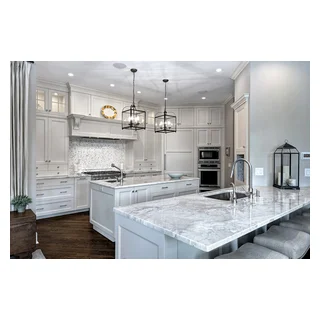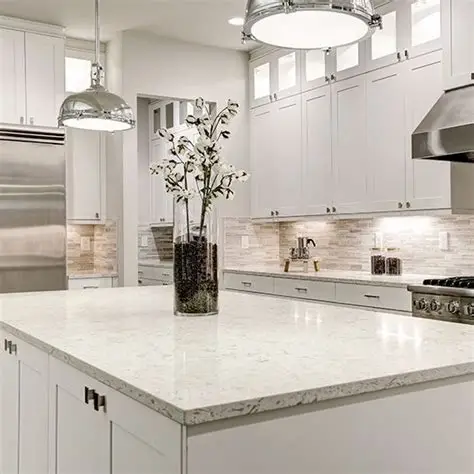Introduction: Quartz vs. Granite in Modern Homes
When choosing a premium countertop material, most homeowners narrow the decision to quartz or granite. Both are durable, stylish, and add significant value to a property. But one question consistently arises: Is quartz cheaper than granite?
The short answer: It depends. Price differences are influenced by factors such as sourcing, fabrication, installation, and the grade of the material. This guide will break down costs, durability, maintenance, and style so you can make an informed choice.

Granite: Natural Beauty and Unique Character
Granite is a natural stone formed deep within the Earth’s crust from slowly cooled magma, creating large mineral crystals that make each slab unique.
For more geological insight, see: How can a large block of granite form layers like an onion?
Key characteristics of granite:
- 100% natural
- Heat- and scratch-resistant
- Wide range of colors from white granite countertops to dramatic black granite countertops
- Requires periodic sealing to prevent staining

Quartz: Engineered for Consistency
Quartz countertops are made from crushed quartz crystals combined with resins and pigments. This creates a non-porous, uniform surface ideal for busy kitchens.
Advantages of quartz:
- Low maintenance—no sealing required
- Wide range of uniform patterns
- Excellent stain resistance
- Available in styles that mimic granite or marble
Cost Comparison: Is Quartz Cheaper Than Granite?
The cost of each material varies by quality and location.
- Granite: $40 to $200 per square foot installed
- Quartz: $50 to $150 per square foot installed
Entry-level granite can be cheaper than quartz, but high-end exotic granite often surpasses quartz in cost. Factors that affect granite prices include rarity, slab size, and supplier. For pricing specifics, many fabricators reference the Aardwolf granite pricing guide.
For practical handling of heavy slabs, tools such as kerb stone movers are essential during installation.
Durability and Maintenance
When comparing Are granite countertops better than quartz countertops?, durability plays a major role.
- Granite: Highly durable but can chip if impacted by heavy objects. Needs sealing once or twice a year.
- Quartz: More flexible and less prone to chipping but not as heat-resistant as granite.
If you’re considering longevity, also explore Which is more durable: granite or quartz countertops? for in-depth comparisons.
Aesthetic Appeal: Nature vs. Consistency
Granite offers natural beauty with unique veining patterns—no two slabs are identical. Quartz offers predictable patterns and colors, making it easier to match in large projects.
For design flexibility:
- Granite pairs well with custom granite backsplash designs and unique cabinet colors.
- Quartz can replicate the look of other stones, including granite and marble, for a consistent style across rooms.
Environmental and Source Considerations
Granite is quarried directly from the Earth, meaning its environmental footprint includes mining and transportation. Quartz is engineered, often using recycled stone, which can reduce waste but involves synthetic resins.
Final Verdict: Which Is Right for You?
If cost is your deciding factor:
- Budget-conscious buyers may find entry-level granite more affordable.
- For low-maintenance convenience, quartz may justify a slightly higher initial price.
Ultimately, whether quartz is cheaper than granite depends on the exact materials, fabrication, and installation choices. Granite’s timeless beauty continues to make it a favorite for homeowners who value natural uniqueness, while quartz attracts those seeking ease of care and consistent design.

